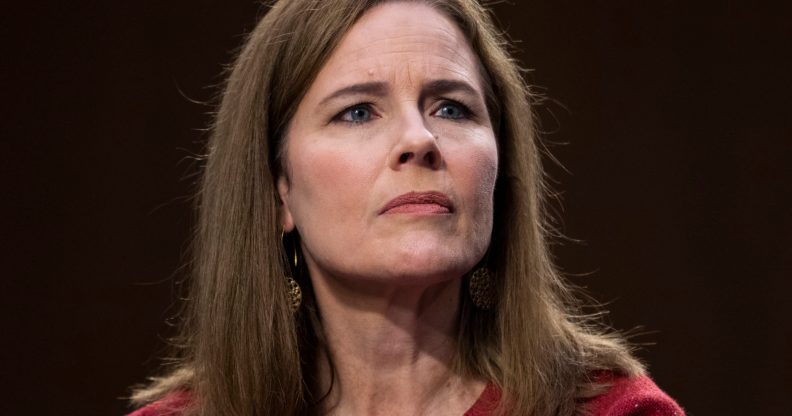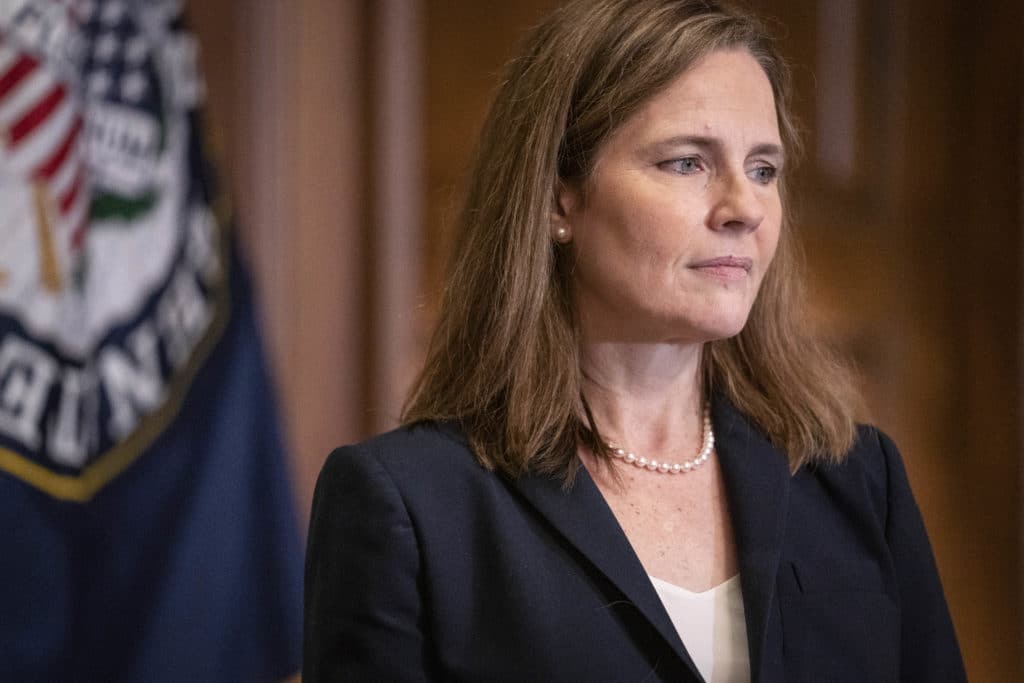Amy Coney Barrett has been confirmed to the Supreme Court. Here are 5 reasons we should all be very, very afraid

Supreme Court justice nominee Amy Coney Barrett testifies on the second day of her Senate Judiciary Committee confirmation hearing. (Tom Williams/CQ-Roll Call, Inc via Getty Images)
Hours before the Senate confirmed Amy Coney Barrett to the Supreme Court, and just over a week before election day, Mitch McConnell gave a chilling warning of what she represents.
“A lot of what we’ve done over the last four years will be undone sooner or later by the next election,” the majority leader told Senate Republicans Sunday (October 25).
“They won’t be able to do much about this for a long time to come.”
If pollsters are right about next week’s election (and given recent history, that remains a big if), Barrett will be Trump’s final Supreme Court appointment.
Joe Biden maintains a national double-digit lead over the incumbent (slightly less than that in swing states), with the Democrats also poised to take control of both the Senate and the House of Representatives.
Biden has vowed to make the Equality Act law on his first day in office, to “flat out change the law” to reverse Trump’s transphobic policies, and to create a country where LGBT+ folk “can live open, proud, and free — without fear”. But one area he will have no control over is the Supreme Court’s right-wing stance.

Donald Trump introduces Amy Coney Barrett as his nominee to the Supreme Court. (Getty)
Barrett’s confirmation means the court now has a firm 6-3 conservative majority. Until recently, with the legendary Ruth Bader Ginsburg on the bench, that balance was split fairly evenly – 5-4, but with chief justice John Roberts (a George W Bush nominee) widely considered a swing vote.
It was under this fragile balance that the court recently voted to extend non-discrimination protections to LGBT+ Americans (in a surprise 6-3 ruling). A 5-4 split also ruled same-sex marriage to be a constitutional right in 2015. Now, not only does it seem unlikely that progressive causes will be advanced by the court, but many – including Pete Buttigieg and Kamala Harris – fear hard-won rights could soon be undone.
1. Religious freedom could be placed above LGBT+ rights.
One of Amy Coney Barrett’s first Supreme Court cases will be a First Amendment dispute between the city of Philadelphia and the Catholic Social Services foster care agency, set to be heard on November 4.
The latter has accused the former of violating its rights of freedom of speech and religion, after the state stopped referring children to its service. This was because of a discriminatory policy banning foster placements with same-sex parents.
In the case, Fulton v. City of Philadelphia, the court will consider whether government services can require taxpayer-funded agencies to act in a way deemed to “directly contradict the agency’s religious beliefs”.
A ruling in favour of CSS could set a precedent for religious freedom to override discrimination protections in all arenas.
2. Same-sex marriage could be undone.
On October 4, a week after Trump nominated Amy Coney Barrett, two conservative Supreme Court justices launched a chilling attack on the 2015 equal marriage ruling.
Clarence Thomas and Samuel Alito wrote in a statement that Obergefell vs Hodges, the case that legalised same-sex marriage in all 50 states, had “ruinous consequences for religious liberty”.
“Due to Obergefell, those with sincerely held religious beliefs concerning marriage will find it increasingly difficult to participate in society without running afoul of Obergefell and its effect on other anti-discrimination laws,” the pair wrote.
“It would be one thing if recognition for same-sex marriage had been debated and adopted through the democratic process, with the people deciding not to provide statutory protections for religious liberty under state law.

Supreme Court nominee Judge Amy Coney Barrett speaks during her confirmation hearing before the Senate Judiciary Committee on Capitol Hill in Washington, DC (SHAWN THEW/POOL/AFP via Getty)
“But it is quite another when the court forces that choice upon society through its creation of atextual constitutional rights and its ungenerous interpretation of the free exercise clause, leaving those with religious objections in the lurch.”
Chase Strangio of the ACLU explained that the statement suggests the justices “are eager to overturn Obergefell already — even though it is only five years old”.
He added: “The brazenness of the rightward direction of the court is a threat to even the most basic expectation of legal protection. What we can expect is the continued erosion of legal protections gained over the past century.”
3. More anti-LGBT+ cases could be heard.
Thomas and Alito’s attack on Obergefell came after the court declined to hear an appeal brought by Kim Davis, the Kentucky clerk who was jailed in 2015 after she refused to process marriage licenses in protest at marriage equality, and who is now being sued by two of the gay couples she rejected.
Thomas and Alito agreed with the decision not to hear the case, because it did not “cleanly present” the key issues. However, with six conservative justices, it would be easier to the court to advance other petitions which seek to undermine LGBT+ rights.
The Supreme Court receives thousands of petitions each year, very few of which are heard.
A “rule of four” decides which ones make it to the court. If four of the nine justices feel a case has merit – be it of national significance, an opportunity to set precedent, or the potential to harmonise conflicting decisions in federal Circuit courts – it is added to the slate.
4. Amy Coney Barrett thinks the constitution should be read exactly as it was written. In 1787.
Throughout the nomination process, Barrett has paid tribute to her late mentor, justice Antonin Scalin.
Until his death in 2016, Scalin dissented against LGBT+ equality on nearly every opportunity and openly compared the rights of gay people to paedophiles and incest.
During her hearings Barrett refused to state whether she agreed with Scalin’s assessment that “the US constitution does not afford gay people the fundamental right to marry”, but has previously indicated the influence his legacy has over her.
Addressing gathered crowds at the White House in September, as she was formally unveiled as Trump’s nominee, Barrett said: “His judicial philosophy is mine, too.”
“A judge must apply the law as written,” she explained. “Judges are not policymakers and they must be resolute in setting aside any policy views they might hold.”

Amy Coney Barrett. (Getty)
Barrett, like Scalin, has been described as a subscriber to originalism, the idea that the US constitution should be interpreted with its original meaning at the time it was written in 1787, rather than as a living, breathing document.
Angus King Jr, senator from Maine, and Heather Cox Richardson, a professor of history at Boston College, rebutted this ideology in a recent essay for The Atlantic.
The pair argued the “real purpose” of originalism “is to justify a return to the legal environment of the early 1930s, when the Court routinely struck down essential elements of the New Deal”.
“Business regulation, social security, and medicare? Not so fast. The Affordable Care Act, environmental protections, a woman’s right to choose? Forget it,” they wrote.
“The constitution should be the sturdy vessel of our ideals and aspirations, not a derelict sailing ship locked in the ice of a world far from our own.”
5. ‘Dogma lives loudly’ within her.
Though Amy Coney Barrett professes to follow the letter of the law regardless of her own beliefs or interpretations, critics have argued that “dogma lives loudly” within her.
In 2017, Barrett was grilled by Democratic senators, during her confirmation hearing to become a United States circuit judge, on whether her staunch Catholic beliefs would affect her judgement on issues such as same-sex marriage and abortion.
Senator Dianne Feinstein told Barrett: “The dogma lives loudly within you, and that’s of concern when you come to big issues that large numbers of people have fought for for years in this country.”
This thread of criticism has followed her into her Supreme Court confirmation hearings, with her ties to various anti-LGBT+ groups and organisations coming to light.
At a hearing on October 13, Democratic senator Patrick Leahy grilled Barrett over her ties to Alliance Defending Freedom – a listed anti-LGBT+ hate group that has brought countless cases seeking to undermine LGBT+ discrimination protections, as well as leading efforts internationally to oppose the decriminalisation of homosexuality.
Asked if she was aware of ADF’s work advocating the criminalisation of gay sex when she undertook a series of lectures for them, Barrett claimed: “I was not aware of those efforts, no.”
Many have also noted Barrett’s membership of the Catholic group People of Praise, which kicks members out for having gay sex.
People of Praise runs a group of schools names Trinity Schools, of which Barrett was once a trustee. She has sent at least three of her seven children to these schools, which teach that reportedly teach being gay is an “abomination”. She did not influence policy, school officials have said, but her alignment with them has sparked concerns.
When asked during her hearings if she would respect “hard-fought freedoms and protections for the LGBT+ community”, Barrett replied: “I have no agenda, and I do want to be clear that I have never discriminated on the basis on the basis of sexual preference and would never discriminate on the basis of sexual preference.
“Like racism, I think discrimination is abhorrent. On the questions of law, however… I can’t give answers to those very specific questions.”

